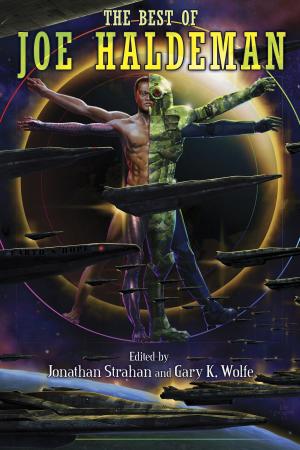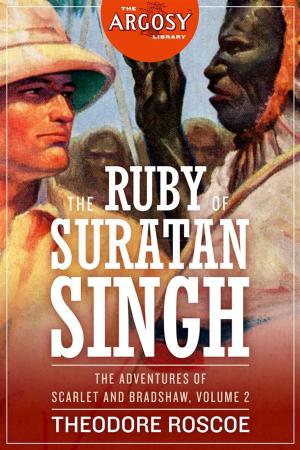Terro-Human Future History Series
Science Fiction & Fantasy, High Tech, Space Opera, Science Fiction, Adventure| Author: | H. Beam Piper | ISBN: | 1230000233742 |
| Publisher: | ScienceAdventure Publishing | Publication: | April 16, 2014 |
| Imprint: | Language: | English |
| Author: | H. Beam Piper |
| ISBN: | 1230000233742 |
| Publisher: | ScienceAdventure Publishing |
| Publication: | April 16, 2014 |
| Imprint: | |
| Language: | English |
An American science fiction author. He wrote many short stories and several novels. He is best known for his extensive Terro-Human Future History series of stories and a shorter series of "Paratime" alternate history tales.
Terro-Human Future History Series
An account of the next 6,000 years of human history, beginning in 1942 with the construction of the first fission reactor, an invention that lays the groundwork for the emergence of anti-gravity technology, space exploration, and the Terran Federation.
Contents
The Edge of the Knife (1957)
Omnilingual (1957)
Four-Day Planet (1961)
Uller Uprising (1952)
Naudsonce (1962)
Little Fuzzy (1962)
Oomphel in the Sky (1960)
Graveyard of Dreams (1958)
The Cosmic Computer (1963)
Space Viking (1962)
The Keeper (1957)
Omnilingual (1957)
To translate writings, you need a key to the code--and if the last writer of Martian died forty thousand years before the first writer of Earth was born ... how could the Martian be translated...?
Four-Day Planet (1961)
Dangerous beasts, impossible weather, and political intrigue on the planet Fenris, a backwater planet with days that last a quarter of a year.
Uller Uprising (1952)
The story of a confrontation between a human overlord and alien servants, with an ironic twist at the end. Like most of Piper's best work, Uller Uprising is modeled after an actual event in human history; in this case the Sepoy Mutiny -- though not a mere retelling of the Indian Mutiny, but rather an analysis of an historical event applied to a similar situation in the far future.
Naudsonce (1962)
Bishop Berkeley's famous question about the sound of a falling tree may have no standing in Science. But there is a highly interesting question about "sound" that Science needs to consider...
Little Fuzzy (1962)
One day Jack Holloway, prospector on the planet Zarathustra, finds what seems to be a small monkey with golden fur; these new introductions (for the first brings a family) are tiny hunters, and prove to be curious and capable tool users. Why is this so important to the new human settlers? - Because a planet inhabited by a sapient race cannot be monopolized by the Zarathustra Company.
Oomphel in the Sky (1960)
Since Logic derives from postulates, it never has, and never will, change a postulate. And a religious belief is a system of postulates ... so how can a man fight a native superstition with logic? Or anything else...?
Graveyard of Dreams (1958)
Despite Mr. Shakespeare, wealth and name are both dross compared with the theft of hope-- and Maxwell had to rob a whole planet of it!
The Cosmic Computer (1963)
Conn Maxwell returns from Terra to his poverty-stricken home planet of Poictesme, “The Junkyard Planet”, with news of the possible location of Merlin, a military super-computer rumored to have been abandoned there after the last war. The inhabitants hope to find Merlin, which they think will be their ticket to wealth and prosperity. But is Merlin real, or just an old rumor? And if they find it will it save them, or tear them apart?
Space Viking (1962)
The murder of his wife-to-be on their marriage day sets Lucas Trask on a quest for revenge. With the purchase of a space ship, Trask enters the world of Space Vikings, and begins raiding worlds while simultaneously searching for his beloved's killer. Realizing that raiding is a waste of resources, Trask begins to trade, begins to build a galactic empire, and begins to face the despotic power of his wife's killer.
The Keeper (1957)
Evil men had stolen his treasure, and Raud set out with his deer rifle and his great dog Brave to catch the thieves before they could reach the Starfolk. That the men had negatron pistols meant little--Raud was the Keeper....
An American science fiction author. He wrote many short stories and several novels. He is best known for his extensive Terro-Human Future History series of stories and a shorter series of "Paratime" alternate history tales.
Terro-Human Future History Series
An account of the next 6,000 years of human history, beginning in 1942 with the construction of the first fission reactor, an invention that lays the groundwork for the emergence of anti-gravity technology, space exploration, and the Terran Federation.
Contents
The Edge of the Knife (1957)
Omnilingual (1957)
Four-Day Planet (1961)
Uller Uprising (1952)
Naudsonce (1962)
Little Fuzzy (1962)
Oomphel in the Sky (1960)
Graveyard of Dreams (1958)
The Cosmic Computer (1963)
Space Viking (1962)
The Keeper (1957)
Omnilingual (1957)
To translate writings, you need a key to the code--and if the last writer of Martian died forty thousand years before the first writer of Earth was born ... how could the Martian be translated...?
Four-Day Planet (1961)
Dangerous beasts, impossible weather, and political intrigue on the planet Fenris, a backwater planet with days that last a quarter of a year.
Uller Uprising (1952)
The story of a confrontation between a human overlord and alien servants, with an ironic twist at the end. Like most of Piper's best work, Uller Uprising is modeled after an actual event in human history; in this case the Sepoy Mutiny -- though not a mere retelling of the Indian Mutiny, but rather an analysis of an historical event applied to a similar situation in the far future.
Naudsonce (1962)
Bishop Berkeley's famous question about the sound of a falling tree may have no standing in Science. But there is a highly interesting question about "sound" that Science needs to consider...
Little Fuzzy (1962)
One day Jack Holloway, prospector on the planet Zarathustra, finds what seems to be a small monkey with golden fur; these new introductions (for the first brings a family) are tiny hunters, and prove to be curious and capable tool users. Why is this so important to the new human settlers? - Because a planet inhabited by a sapient race cannot be monopolized by the Zarathustra Company.
Oomphel in the Sky (1960)
Since Logic derives from postulates, it never has, and never will, change a postulate. And a religious belief is a system of postulates ... so how can a man fight a native superstition with logic? Or anything else...?
Graveyard of Dreams (1958)
Despite Mr. Shakespeare, wealth and name are both dross compared with the theft of hope-- and Maxwell had to rob a whole planet of it!
The Cosmic Computer (1963)
Conn Maxwell returns from Terra to his poverty-stricken home planet of Poictesme, “The Junkyard Planet”, with news of the possible location of Merlin, a military super-computer rumored to have been abandoned there after the last war. The inhabitants hope to find Merlin, which they think will be their ticket to wealth and prosperity. But is Merlin real, or just an old rumor? And if they find it will it save them, or tear them apart?
Space Viking (1962)
The murder of his wife-to-be on their marriage day sets Lucas Trask on a quest for revenge. With the purchase of a space ship, Trask enters the world of Space Vikings, and begins raiding worlds while simultaneously searching for his beloved's killer. Realizing that raiding is a waste of resources, Trask begins to trade, begins to build a galactic empire, and begins to face the despotic power of his wife's killer.
The Keeper (1957)
Evil men had stolen his treasure, and Raud set out with his deer rifle and his great dog Brave to catch the thieves before they could reach the Starfolk. That the men had negatron pistols meant little--Raud was the Keeper....















